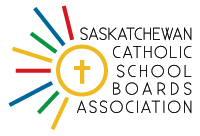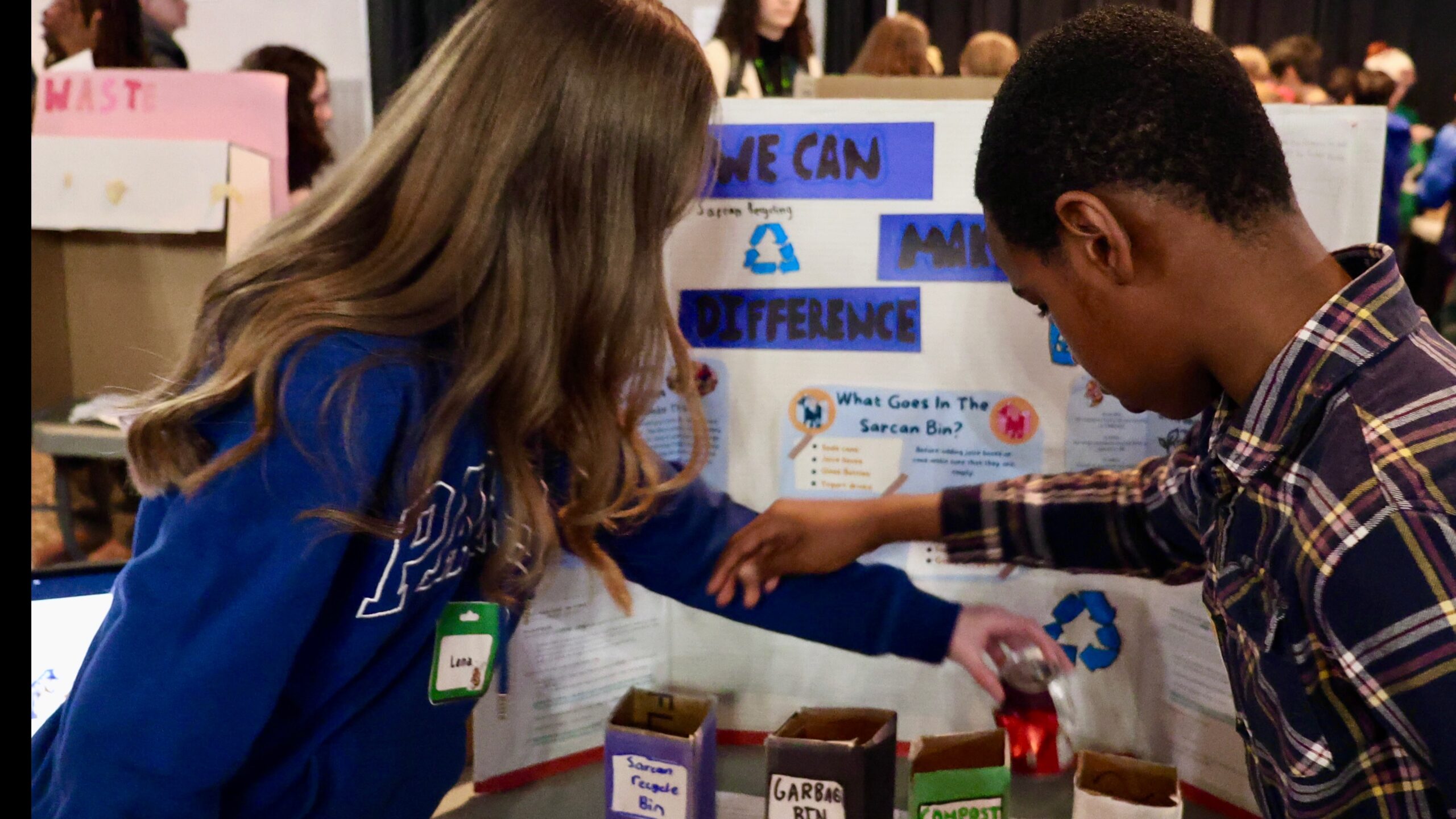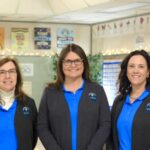Students from 12 Saskatoon elementary schools (five Catholic, seven public) gathered at the Western Development Museum April 8, 2025, to showcase their environmental sustainability projects and share what they learned.
The Student Action for a Sustainable Future (SASF) program involves students from Greater Saskatoon Catholic Schools and Saskatoon Public Schools in action projects that reduce classroom, school, and household greenhouse gas emissions. Projects achieve positive reductions in energy, water, waste, food, and transportation, as well as increases in biodiversity.
The student showcase enables students to share their environmental success stories, showcase project results and celebrate the impacts of Saskatoon youth in creating real-world environmental change.
The program is a partnership between the City of Saskatoon, Saskatoon Light and Power, Greater Saskatoon Catholic Schools, Saskatoon Public Schools, the University of Saskatchewan Sustainability Research Institute, and Nutrien.
Projects from GSCS students
St. Anne School
Grade 5/6
Teacher: Ted Elash
Concerned about the amount of waste our school was producing, our class set out to answer the question: “How wasteful are we?” The answer? A lot! Using the empathy design process, students moved through the stages of empathize, define, ideate, prototype, test, and now share. Through this journey, they explored different ways to tackle waste reduction in our school.
Their projects included:
- SARCAN Recycling Program – Encouraging students and staff to properly recycle bottles and cans.
- Classroom Compost – Diverting organic waste from the garbage into composting bins.
- Paper Waste Education – Teaching peers about the impact of paper waste and how to reduce it.
- Classroom Food Bins – Providing a space for uneaten, unopened food to be shared rather than thrown away.
- Waste-Free Wednesdays – Challenging students to bring lunches with no single-use packaging.
As you will hear from our class, some projects were more successful than others, but each one played a role in helping us think critically about our waste and how we can make a difference!
St. Volodymyr School
Grade 6
Teacher: Jonah Ginther
For our Student Action for a Sustainable Future initiative, our class has been working on multiple projects to promote sustainability and reduce waste in our school. One group focused on composting by obtaining and decorating bins, then implementing a composting program to reduce food waste. Another group tackled littering by launching an anti-litter initiative, organizing events such as “No Wrapper Day” and rewarding classrooms that kept their floors the cleanest throughout the week. The waste-free group introduced a food trade program, providing bins where students could place unwanted food for others in need. Our lights group conducted an energy audit, determining which lights were necessary in each classroom based on natural light availability and labeling switches accordingly. Lastly, the phantom-energy group researched the energy consumption of Chromebook carts, calculating their cost, CO₂ emissions, and wattage use. They then installed timers to ensure carts only charge when needed. Throughout the project, students learned how to promote a change in our school and promoted others to make that change outside of school, too.
École St. Mother Teresa School
Grade 6/7
Teacher: Sharon Lonsberry
The Grade 6/7 class at École St. Mother Teresa recognized some great projects started last year with the SASF class, but they weren’t continued as the group moved on. They had started school-based composting, and we noticed that too much garbage was not finding its way to our recycling bins, and we no longer had a composting program. Students started a re-education campaign for lunch waste, composting, recycling and reusing. We reduced waste in all areas by almost half! Our water group focused on education to reduce consumption and promote rainwater recycling in our Grasslands Garden. Our biodiversity group focused on supporting our neighboring park: The Saskatoon Natural Grasslands (SNG). This work focused on a “Grasslands Medicine Garden,” housing plants with strong medicinal properties that people are not allowed to harvest in the SNG. People may pick our medicines for their personal use. Because this group is passionate about medicines of the land, they are also working with an advocacy group for the preservation of the SNG. We can’t wait to show you our accomplishments and what we have learned!
St. Dominic School
Grade 6/7
Teacher: Alex Wist
Students in Grade 6/7 at St. Dominic School worked on several project areas for SASF, focusing on reducing environmental impacts in the areas of waste, water, energy, and transportation. Students conducted a classroom waste audit and then re-educated their peers to reduce the amount of recycling entering the waste stream and to increase the diversion rate in their classroom compost program. Another group focused on active transportation and encouraged students and staff to pledge to reduce their carbon footprint by participating in a “Car-Free Day.” The water group investigated school water consumption, conducted water audits to identify leaking faucets and determine faucet flow rates, and educated students and staff by sharing tips for water conservation both at school and at home. Lastly, students focused on saving electricity by reducing the time computer screens are on in the computer lab and installing timers on school computer carts to reduce phantom energy.
École St. Paul School
Grade 4/5 and Grade 5/6
Teacher Veronica Kmiech
This year, two classrooms from École Saint Paul School participated in the SASF program. We did our learning as full classes and then we broke into expert groups to create our presentations for the showcase. Our main area of focus was waste reduction, but we also did a couple of electricity projects so that we could get timers for our computer and tablet carts. In terms of waste projects, we started our year with a Children’s Only Re-gift Shop to promote more sustainable gifting practices. From there, we completed waste audits, revitalized our marker recycling program, and encouraged home composting and garbage-free lunches. As a Catholic school, we have been following Development and Peace’s Share Lent resources, which gave us many other ideas for sustainability projects. One of these that we will present is our learning around the environmental and social impacts of the fashion industry and textile waste. We are so excited to share our work with the community at the showcase!
For more information visit: https://bit.ly/SASFprogram







